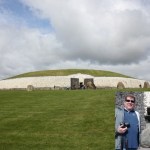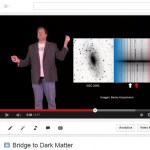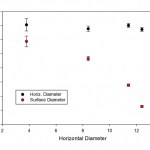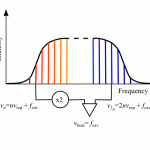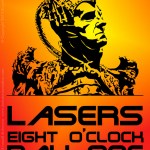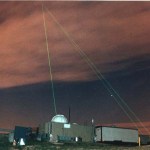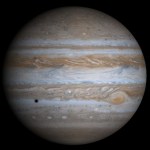Astronomy
"More wine?"
"Hmm? Oh, yes, thank you. Sorry, I was--"
"Thinking about mathematics, I wager. Prime numbers was it?"
"No, just distracted. It's this blasted heat."
"It is the longest day of the year."
"Yes, but normally not so hot."
"Especially here. You think this is hot, visit me in Syene sometime. You think it gets hot here... You would melt in Syene in the summer."
"So I hear. I suppose it's the moderating influence of the ocean that keeps us cooler."
"That, and we're closer to the Sun."
"What?"
"It's true. Today in Syene, the Sun will be directly overhead at mid-day, while you still have…
The southeastern sky had been lightening for some time, stars slowly fading away. Off to the west, a band of clouds was moving in, obscuring stars as it came, but they wouldn't make it in time to block the sunrise. A good thing, as the last two dawns had been cloudy. There would be maybe two more chances this year to see if everything worked, then another full turn of the seasons before their next chance.
She sat on the cold ground, behind the offering bowls, a bit off the line of the main passage. She was inside the ring of posts marking the final perimeter, but outside what would become…
I've decided to do a new round of profiles in the Project for Non-Academic Science (acronym deliberately chosen to coincide with a journal), as a way of getting a little more information out there to students studying in STEM fields who will likely end up with jobs off the "standard" academic science track.
Sixth in this round is an "adult-onset engineer" working at NASA on some cool stuff.
1) What is your non-academic job? I am a thermal engineer at NASA's Jet Propulsion Lab, working in the Cryogenic Systems Engineering group. Our group provides thermal engineering support (both cryogenic…
The first time you hear about dark matter, it sounds kind of crazy-- asserting that we're surrounded by tons of invisible stuff is usually a good way to get locked up. But the process of its discovery is surprisingly ordinary: it's just what you do when you play cards.
Here's the second green-screen video I've done to promote Eureka: Discovering Your Inner Scientist, which comes out three weeks from tomorrow (but can be pre-ordered today!). This one is about card games, modern astrophysics, and why you probbaly shouldn't play bridge against Vera Rubin:
For those who dislike video, I'll put…
A couple of times last week, I mentioned on Twitter that I was going to demonstrate relativity with toddler toys and string. This was an inspiration that hit late on Thursday, when I was trying to think of a better way to explain embedding diagrams (the technical term for those stretched-rubber-sheet pictures that everybody uses to illustrate general relativity).
Specifically, I was hearing a lot from students who didn't understand the point of what was supposed to be weird about those. So I was trying to think of how to do a demo, when I realized we could measure the change in geometry that…
I'm teaching a Gen Ed course on relativity this term, which means I'm spending the last few weeks of the term discussing black holes. Which, in turn, means there was no way I couldn't use that story about Kip Thorne calculating the appearance of a black hole for the movie. Especially since I have the students reading Thorne's book.
And that, in turn, meant I needed to see the movie. So we got a sitter for the kids Saturday night, and went to the local theater to check it out. And, you know, it's pretty much what it's advertised as: A very pretty giant SF movie, with all that implies, both…
I'm teaching relativity in a course with an astronomy prefix, which means I'm obliged to talk about stars and stuff. Yesterday's lecture was about neutron stars, and how their existence was confirmed by the discovery of pulsars (with the story of Jocelyn Bell Burnell included). This requires some discussion of angular momentum to explain how something that big ends up spinning that fast (cribbing a bit from these online notes), so I needed a good demonstration of angular momentum. Which is when I remembered this 2013 post with SteelyKid on the playground, where I estimated the mass of the…
I got the time for the regular hangout wrong, and then we had some weird computer difficulties, so we only had ten minutes for Uncertain Dots this week. Which was enough time for me to say disparaging things about comic book movies, so, you know, if that interests you...
Here's the making of Interstellar story about Kip Thorne.
Here's the Avengers 2 trailer.
Also, a program note: I will be at MASS MoCA tonight talking about Particle Fever, if you'd like to hear me talk about real physics on film, or just take issue with my slagging off comic-book movies in person...
I enjoyed Caleb Scharf's previous book, Gravity's Engines a good deal, so I was happy to get email from a publicist offering me his latest. I'm a little afraid that my extreme distraction of late hasn't really treated it fairly, but then again, the fact that I finished it at all in my current state of frazzlement may be the best testament I can offer to its quality. This is a sweeping survey of what we've learned about our place in the universe over the last five hundred years or so.
Now, a grandiose description like that often portends a bunch of wifty philosophizing that poses grand…
With this morning's announcement of the 2014 Nobel Prizes in Physiology or Medicine, the annual Nobel season is upon us. I didn't do a betting pool post this year, because when I announced last year's winner, I was reminded that I had never paid off the prize to the previous year's winner. So I think I just don't have the time to manage that contest right now...
Anyway, the Physics prize will be announced tomorrow, and while I'm not going to host a contest, I did want to offer some space for speculation about what might win. Unlike last year, when the suspense was mostly about which subset of…
On Twitter Sunday morning, the National Society of Black Physicsts account retweeted this:
Using Lasers to Lock Down #Exoplanet Hunting #Space
http://t.co/0TN4DDo7LF
— ✨The Solar System✨ (@The_SolarSystem) September 28, 2014
I recognized the title as a likely reference to the use of optical frequency combs as calibration sources for spectrometry, which is awesome stuff. Unfortunately, the story at that link is less awesome than awful. It goes on at some length about the astronomy, then dispenses with the physics in two short paragraphs of joking references to scare-quoted jargon from the…
I get a fair number of books to review, but I'm often pretty bad about writing them up in a timely manner. Of course, most of them are well over 70 pages long, which is why I've managed to turn around Roberto Trotta's The Edge of the Sky: All You Need to Know About the All-There-Is in the course of a weekend.
As you can probably get from the title, this is a book about astronomy written in Up Goer Five style, using only the thousand most common English words (which are helpfully listed near the start of the book, in case you want to check whether he cheated...), plus proper names. And there'…
OK, the photo above is a recent picture of me-- yesterday, in fact. But the spiral-carved rock I'm standing next to was carved that way a bit more than five thousand years ago, so that ought to count as a throwback...
We've been in Dublin the last few days, and on Thursday we took a bus tour out to Newgrange. this is one of the things I wanted to make sure to see while we were here, as I make reference to it in the forthcoming book, and at least two classes that I teach. And it is, indeed, spectacular; the reconstructed white wall might be historically dubious, but the interior passage and…
Right around the time I shut things down for the long holiday weekend, the Washington Post ran this Joel Achenbach piece on mistakes in science. Achenbach's article was prompted in part by the ongoing discussion of the significance (or lack thereof) of the BICEP2 results, which included probably the most re-shared pieces of last week in the physics blogosphere, a pair of interviews with a BICEP2 researcher and a prominent skeptic. This, in turn, led to a lot of very predictable criticism of the BICEP2 team for over-hyping their results, and a bunch of social-media handwringing about how the…
I didn't plan to do a follow-up to yesterday's post about the optics of sending messages with lasers, but then I starting idly thinking about detection, prompted in part by a bunch of conversations with my summer students about single-photon detectors. which led to scribbling on the back of an envelope, which led to Googling, and suddenly, I have a follow-up post.
So: as we said yesterday, if you want to send messages over a distance of ten light years, a relatively efficient way to do this might be to send them via lasers. This results in the light being spread over a pretty big area, though…
In the comments to yesterday's grumpy post about the Fermi paradox, makeinu raises the idea that advanced aliens would be using more targeted communications than we do:
On the point about electromagnetic communications: even we are now using lasers to target communications with space, because it’s simply more efficient and reliable.
It’s also basically impossible to intercept, since you literally have to interrupt the beam to do so.
This is true, to a point, but when you're talking about interstellar distances, it's not quite true that you have to interrupt the beam to detect communications…
I've seen a bunch of people linking approvingly to this piece about the "Fermi paradox," (the question of why we haven't seen any evidence of other advanced civilizations) and I can't quite understand why. The author expends a good deal of snark taking astronomers and physicists to task for constructing elaborate solutions to Fermi paradox on the basis of shoddy and unjustified assumptions. And then proceeds to offer a different solution for the Fermi paradox based on shoddy and unjustified assumptions. Whee!
I mean, there is an element of this that's useful, namely the reminder that "We…
For some reason, the topic of really big rocks came up at dinner the other night, and SteelyKid declared that she wanted to find "A rock as big as the solar system." We pointed out that that was pretty much impossible, more or less by definition, rocks being sub-parts of the solar system.
"OK, how about a rock as big as Jupiter?" That's a much harder question to answer, and required a trip to the Internet. Not during dinner, of course-- it's hard enough to get her to eat when we're all sitting at the table-- but a day or so later, which led to this blog post.
So, there are a couple of…
The Cosmos reboot season finale (or possibly series finale; not sure if they're trying for a second set of episodes) was last night, but I wasn't able to take part in the live-tweeting of it thanks to a super-restless Pip who didn't drop off until 9:30 EDT. I suppose I could've waited to start the DVR until I would synch up with the West Coast showing, but then, I also need sleep. and I greatly enjoyed being able to fast-forward through the innumerable commercials.
And, really, if you want the story of the Cosmos reboot in a nutshell, there's no better capsule summary than the treatment of…
While solo-parenting Sunday night, I still managed to get free of The Pip just barely in time to catch the start of Cosmos. This was a strange episode in a couple of ways, chiefly having to do with the selection of topics.
For one thing, there's no small irony in the fact that following a couple of weeks in which host Neil deGrasse Tyson has been raked over metaphorical coals for dismissing philosophy as pointless because it doesn't lead to testable predictions, a big chunk of the episode was given over to wildly impractical speculations about panspermia and related topics. I realize it's…

